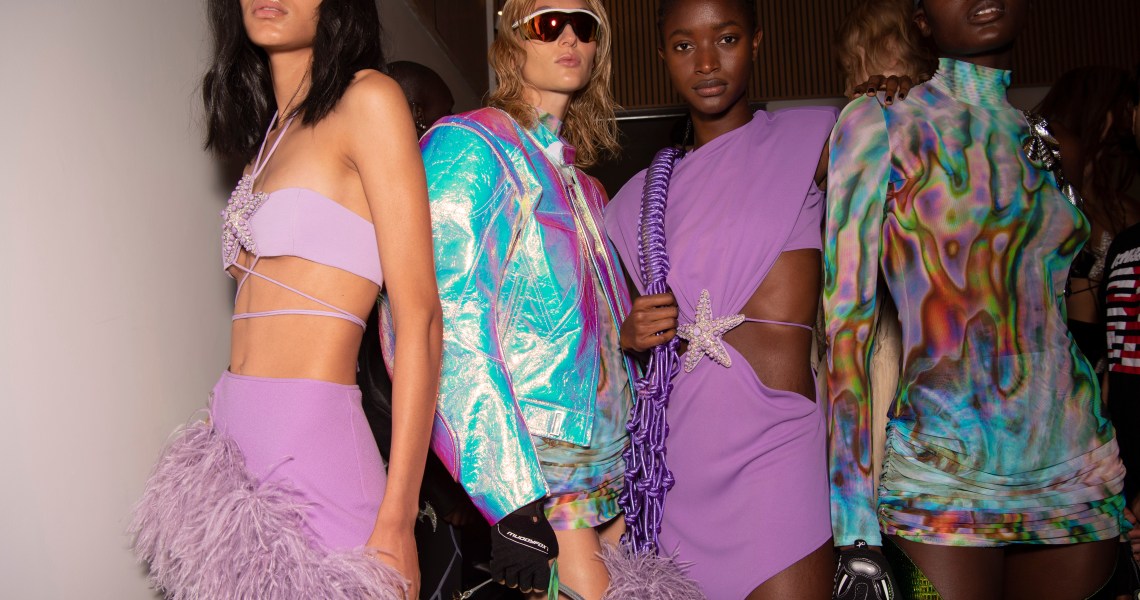To stay up-to-date on the latest runway shows, digital presentations and behind-the-scenes buzz, sign up to receive Glossy’s daily Fashion Month Briefing (September 9-October 4).
Super Sunday at London Fashion Week featured some of the biggest brands, this time inspired by tradition and women. Among them: 16Arlington, Nensi Dojaka, David Koma, Rejina Pyo, Halpern, Erdem and Simone Rocha. Even upcoming designers shared the same thought. For example, for her collection, Yuhan Wang looked to female pilots including Emilia Earheart for inspiration. At the same time, digital designers and innovators like Ancuta Sarca brought disruption to the catwalk format. And all in the capital prepared for a day of mourning.
The day started with Nensi Dojaka, who won the 2021 LVMH Prize and is an alumnus of the non-profit talent incubator Fashion East, which launched some of London’s most successful designers. On the runway, Dojaka showed footwear for the first time, revealing ambitions for growing her company’s accessories business after finding success with swimwear and jewelry. For spring 2023, the 2-year-old brand also expanded its ready-to-wear beyond its signature strappy tops and dresses, to include maxi versions and more trouser options, and the introduction of heart motifs. Nensi Dojaka has quickly secured top stockists like Matchesfashion and Mytheresa, and it launched at more than 60 other retail partners in 2022. In addition, Dojaka’s ’90s-style feminine pieces have become favorites among celebrities including Zendaya and Bella Hadid.
For spring 2023, wearable feminine pieces were also featured by Rejina Pyo, who focused on bringing to the working woman comfortable takes on tailoring and dresses, the latter in knit. And, while 16Arlington is best known for its sparkling evening wear, its runway collection featured more commercial-friendly outerwear, as well as its new cult Kikka bag.
As for other highlights, Simone Rocha’s collection included menswear, with ruffles, for the first time. Meanwhile, David Koma took inspiration from female divers and oil spills for his collection that focused on evening and outerwear.
Finally, New York-born Michael Halpern stayed true to his roots by debuting a collaborative collection with Mattel around Barbie’s 60th anniversary — Barbie has inspired multiple Halpern looks in seasons past. For its part, Barbie has been scaling its partnerships, in anticipation of the “Barbie” film that is coming out in July 2023.
Chief executive of the British Fashion Council Caroline Rush said, “It’s been a brilliant day of shows today. Our domestic and international media retailers, stylists and photographers here have been talking about the incredible creativity of London. The last-minute reorganization of shows from Monday to other days has just shown how the community works together at its best.” The B2B side of fashion week will continue until Tuesday, while a consumer-facing fashion celebration focused on the type of retail and product activations that are not possible this week, as a result of the period of mourning, will take place in October
Ad position: web_incontent_pos1
Innovation in upcycling and digital fashion
Romanian-born footwear designer Ancuta Sarca was a highlight of Sunday’s shows, with a presentation at the NewGen exhibition space next to Selfridges. The show highlighted Sarca’s first unisex ready-to-wear collection, which was made from Skims deadstock and shown anchored with kitten-heel trainers, created in collaboration with Vans. Sacrca is hoping to explore more collaboration opportunities moving forward. The theme of innovative upcycling has played throughout this London Fashion Week, with almost all designers incorporating deadstock into a part of their collection.
While the IRL shows went on around London, digital fashion held its first IRL event during London Fashion Week, at an immersive space called Picnic. The Digital Fashion Weekend, sponsored by digital brand Avata and Mad Agency, featured 12 hours of shows by digital fashion designers and artists. Presentations by The Fabricant and TikTok star Stephy Fung played out on wall-to-wall screens, which was reminiscent of the Cult & Rain launch last month.
The Digital Fashion Weekend presented an opportunity to introduce digital fashion to the IRL London fashion audience. “London has been such an important city for creativity. We’re still pretty far away from digital fashion becoming something that people use and engage with on a day-to-day basis. But that will change as the technology gets better,” said Avata’s founder, who asked to remain anonymous.
Danielle Loftus, founder of digital fashion agency This Outfit Does Not Exist, said events like Digital Fashion Weekend are crucial for showing the potential of digital fashion. “You’re bringing in a new audience and exposing them to what digital fashion is,” she said. “You’re also educating the existing [digital fashion] audience, while giving them an opportunity to connect.”
Ad position: web_incontent_pos2
And London Fashion Week itself could benefit from engaging in the format. “Tonight, we had all these digital fashion shows,” said Avata’s founder. “Models haven’t had to travel in and there hasn’t been shipping of collections; the items are made-to-order. The digital fashion space will move forward once people understand how it can resolve so many issues currently going on in the industry, while also allowing so many young designers access to creating a collection.”
Loftus said the Digital Fashion Weekend of the future will overlay the physical one. “The evolution I’m excited to see is when digital fashion becomes its own independent vertical for brands. You’ll have metaverse-native fashion weeks on top of the regular fashion weeks, with entirely new collections designed for avatars that may not have a common thread with original collections,” she said. While designers like Tommy Hilfiger have shown phygital fashion shows, a phygital fashion week is yet to be experienced.




